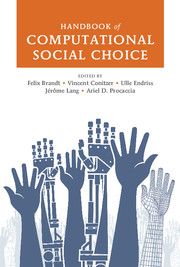Book contents
- Frontmatter
- Contents
- Foreword
- Contributors
- 1 Introduction to Computational Social Choice
- Part I Voting
- 2 Introduction to the Theory of Voting
- 3 Tournament Solutions
- 4 Weighted Tournament Solutions
- 5 Dodgson's Rule and Young's Rule
- 6 Barriers to Manipulation in Voting
- 7 Control and Bribery in Voting
- 8 Rationalizations of Voting Rules
- 9 Voting in Combinatorial Domains
- 10 Incomplete Information and Communication in Voting
- Part II Fair Allocation
- Part III Coalition Formation
- Part IV Additional Topics
- References
- Index
10 - Incomplete Information and Communication in Voting
from Part I - Voting
Published online by Cambridge University Press: 05 May 2016
- Frontmatter
- Contents
- Foreword
- Contributors
- 1 Introduction to Computational Social Choice
- Part I Voting
- 2 Introduction to the Theory of Voting
- 3 Tournament Solutions
- 4 Weighted Tournament Solutions
- 5 Dodgson's Rule and Young's Rule
- 6 Barriers to Manipulation in Voting
- 7 Control and Bribery in Voting
- 8 Rationalizations of Voting Rules
- 9 Voting in Combinatorial Domains
- 10 Incomplete Information and Communication in Voting
- Part II Fair Allocation
- Part III Coalition Formation
- Part IV Additional Topics
- References
- Index
Summary
Many voting schemes (and other social choice mechanisms) make stringent assumptions about the preference information provided by voters, as well as other aspects of the choice situation. Realizing these assumptions in practice often imposes an undesirable and unnecessary burden on both voters and mechanism designers with respect to the provision of such information. This chapter provides an overview of a variety of topics related to the information and communication requirements of voting. One theme underlying much of the work discussed in this chapter is its focus on determining winners or making decisions with incomplete or stochastic information about voter preferences—or in some cases, about the alternatives themselves. This includes work on the computational complexity of determining possible/necessary winners and regret-based winner determination; the query or communication complexity of eliciting preferences; practical schemes for preference elicitation; winner determination under alternative uncertainty; the sample complexity of learning voting rules; and compilation complexity.
Introduction
Voting methods are extremely attractive as a means for aggregating preferences to implement social choice functions. However, many voting schemes (and other social choice mechanisms) make stringent assumptions about the preferences provided by voters. For instance, it is usually assumed that each voter provides a complete preference ranking of all alternatives under consideration. In addition, such schemes are often implemented assuming complete knowledge of the set of alternatives under consideration, and over which voters provide their preferences.
While these modeling requirements are reasonable in many domains—especially high-stakes settings such as political elections—increasingly we see the methods of social choice applied to lower-stakes, higher frequency domains, including web search, product recommendation, market segmentation, meeting scheduling, group travel planning, and many others. For such problems, demanding complete preference information is not viable for several key reasons. First, the number of options from which a winning alternative is to be selected is often extremely large (e.g., the set of possible products under consideration) and may even be combinatorial in nature (e.g., the set of feasible schedules or plans). Second, requiring the complete specification of a preference ordering may impose unwarranted cognitive and communication demands given the stakes involved. It may even be unnecessary in many instances—partial information may be sufficient to reach the correct decision.
- Type
- Chapter
- Information
- Handbook of Computational Social Choice , pp. 223 - 258Publisher: Cambridge University PressPrint publication year: 2016
- 8
- Cited by



